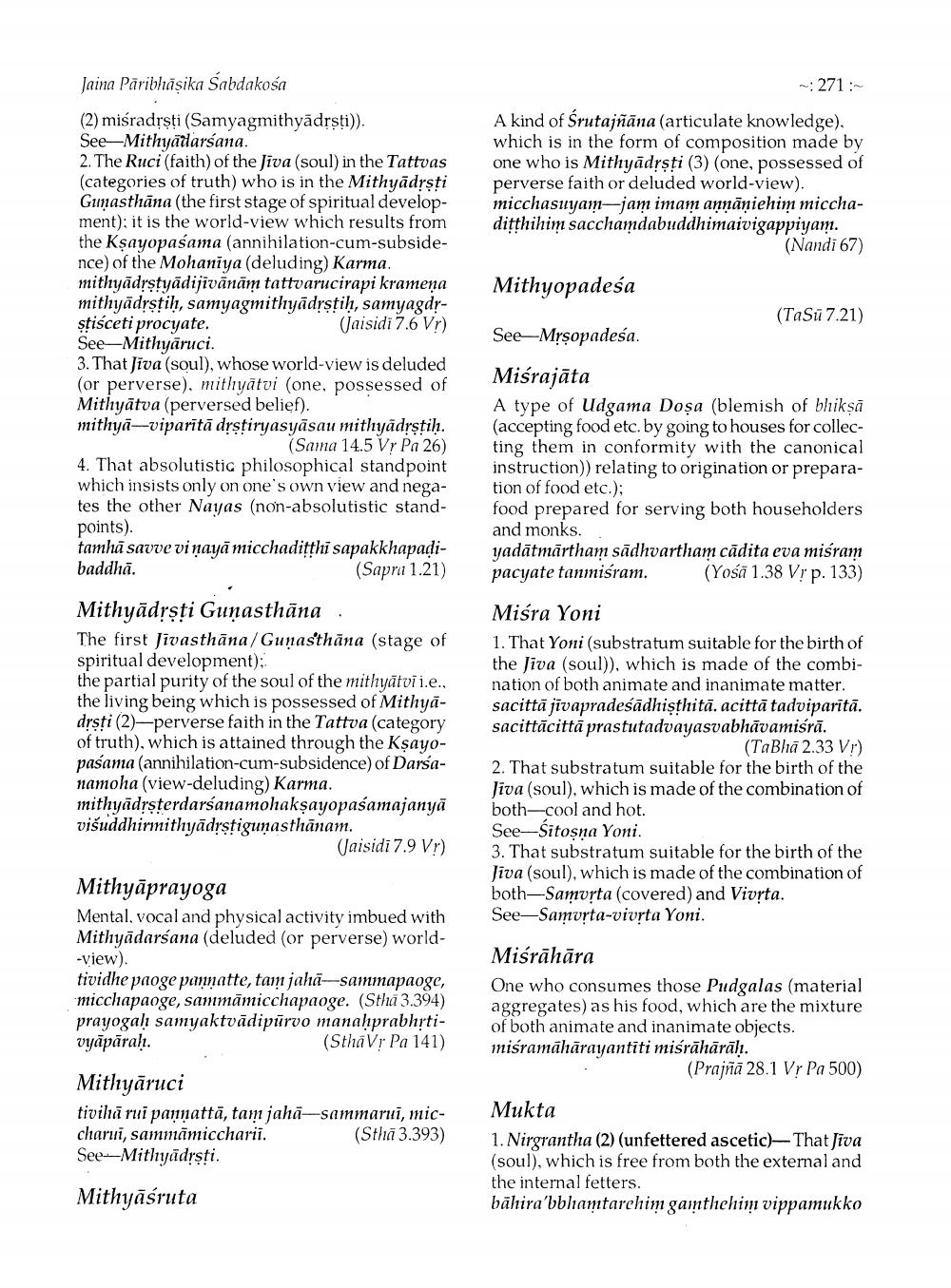________________
Jaina Paribhasika Sabdakosa
(2) misradrsti (Samyagmithyadrști)). See-Mithyatlarsana.
2. The Ruci (faith) of the Jiva (soul) in the Tattvas (categories of truth) who is in the Mithyadṛṣṭi Gumasthana (the first stage of spiritual development); it is the world-view which results from the Kṣayopasama (annihilation-cum-subsidence) of the Mohaniya (deluding) Karma. mithyādṛṣṭyädijivänäm tattvarucirapi kramena mithyadṛṣṭih, samyagmithyadṛstiḥ, samyagdrstiśceti procyate. (Jaisidi 7.6 Vr) See-Mithyaruci. 3. That Jiva (soul), whose world-view is deluded (or perverse), mithyatvi (one, possessed of Mithyatva (perversed belief). mithya-viparită dṛṣṭiryasyāsau mithyddṛṣṭih. (Sama 14.5 Vr Pa 26) 4. That absolutistic philosophical standpoint which insists only on one's own view and negates the other Nayas (non-absolutistic standpoints).
tamh savve vinaya micchadithi sapakkhapaḍibaddha. (Sapra 1.21)
Mithyadrṣți Gunasthāna
The first Jivasthana/Gunasthana (stage of spiritual development);
the partial purity of the soul of the mithyatvii.e.. the living being which is possessed of Mithyadrsti (2) perverse faith in the Tattva (category of truth), which is attained through the Kṣayopasama (annihilation-cum-subsidence) of Darsanamoha (view-deluding) Karma. mithyadrṣterdarsanamohakṣayopasamajanyā visuddhirmithyadrṣṭigunasthanam.
(Jaisidi 7.9 Vr)
Mithyaprayoga
Mental, vocal and physical activity imbued with Mithyadarsana (deluded (or perverse) world-view).
tividhe paoge pamatte, tam jaha-sammapaoge, micchapaoge, sammamicchapaoge. (Sthi 3.394) prayogaḥ samyaktvädipurvo manaḥprabhṛtivyāpāraḥ. (Stha Vṛ Pa 141)
Mithyaruci
tiviharui pannattā, tam jahā-sammarui, miccharui, sammămiccharii.
(Sth 3.393)
See-Mithyddṛsti.
Mithyaśruta
~271~
A kind of Śrutajäna (articulate knowledge). which is in the form of composition made by one who is Mithyadṛṣṭi (3) (one. possessed of perverse faith or deluded world-view). micchasuyam-jam imam anṇāṇiehim micchaditthihim sacchandabuddhimaivigappiyam
(Nandi 67)
Mithyopadeśa
See Mrṣopadeśa.
Miśrajäta
A type of Udgama Dosa (blemish of blikṣā (accepting food etc. by going to houses for collecting them in conformity with the canonical instruction)) relating to origination or preparation of food etc.);
(TaSú 7.21)
food prepared for serving both householders.
and monks.
yadātmārtham sadhvartham cadita eva misram pacyate tanmiśram. (Yosa 1.38 Vr p. 133)
Misra Yoni
1. That Yoni (substratum suitable for the birth of the Jiva (soul)), which is made of the combination of both animate and inanimate matter. sacittäjivapradeśādhiṣṭhită, acittä tadviparītā. sacittacitta prastutadvayasvabhāvamiśrā.
(TaBha 2.33 Vr)
2. That substratum suitable for the birth of the Jiva (soul), which is made of the combination of both-cool and hot. See-Sitoşna Yoni.
3. That substratum suitable for the birth of the Jiva (soul), which is made of the combination of both-Samuṛta (covered) and Vivṛta. See-Samorta-vivṛta Yoni.
Miśrähära
One who consumes those Pudgalas (material aggregates) as his food, which are the mixture of both animate and inanimate objects. misramahārayantiti miśrāhārāḥ,
(Prajña 28.1 Vr Pa 500)
Mukta
1. Nirgrantha (2) (unfettered ascetic)-That Jiva (soul), which is free from both the external and the internal fetters.
bahira bbhamtarehim gamthehim vippamukko




